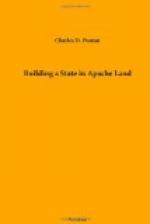Pesquiera issued a bloodthirsty proclamation, in the usual grandiloquent language of Spain, calling all patriotic Mexicans to arms, to exterminate the invaders and to preserve their homes. The roads fairly swarmed with Mexicans. Those who had no guns carried lances, those who had no horses went on foot. Caborca was soon surrounded by Mexicans, and the forty-two Americans and one little boy took refuge in the church on the east side of the plaza.
This proved only a temporary refuge. An Indian shot a lighted arrow into the church and set it on fire. The Americans stacked arms and surrendered. My God! had they lost their senses? These forty-two American gentlemen, who had left their wives, children, and friends in California a month or two before under a contract with Pesquiera were butchered like hogs in the streets of Caborca, and neither God nor man raised hand to stop the inhuman slaughter.
They had not come within two hundred miles of my place, and nobody could have turned them from their purpose if they had. Many of them were old friends and acquaintances in California, and their massacre cast a gloom over the country.
There was only one redeeming act that ever came to my knowledge, and I know it to be true. When Pesquiera’s order to massacre the invaders were read, Gabilonda, second in command, swore he would have nothing to do with it, and mounting his horse swung the little boy Evans behind him and galloped away to Altar. Gabilonda carried him to Guaymas, from where he was afterwards sent to California.
It has been stated that the corpses were left in the streets for the hogs to eat, but the cure of Caborca assured me that he had a trench dug and gave them Christian interment. I never saw nor conversed with any of the leaders, but a detachment came up the Gila River to Tucson and Tubac, enlisting recruits, but could only raise twenty-five or thirty men. The invasion was generally discouraged by the settlers on the Santa Cruz. When they passed by Sopori on their way to join the main body, I remember very well the advice of old Colonel Douglas, a veteran in Mexican revolutions. He said,—
“Boys, unless you can carry men enough to whip both sides, never cross the Mexican line.”
I was at Arivaca when the Santa Cruz contingent returned, badly demoralized, wounded, naked, and starving. The place was converted into a hospital for their relief, with such accommodations as could be afforded. Pesquiera was well aware of the adage that “dead men tell no tales.” Crabb was beheaded, and his head carried in triumph to Pesquiera, preserved in a keg of Mescal, with the savage barbarity of the days of Herod. The contracts which would have compromised Pesquiera with the Mexican government were destroyed by fire. So ended the Crabb Expedition, one of the most ill-fated and melancholy of any in the bloody annals of Mexico.
The result of this expedition, commonly called “Crabb’s,” was that the Mexican government laid an embargo upon all trade with this side of the line, and business of all kinds was paralyzed.




